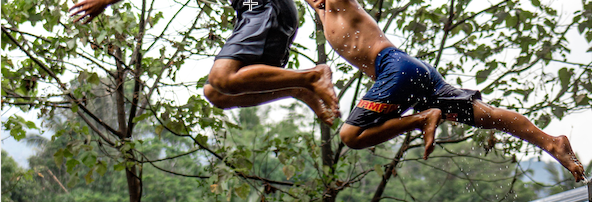Jump, But Only When Ready

She watched him holding his hands out to her as he wavered on the top of the tree stump. He wanted to jump. He’d seen his brother jump. Although younger, he was tempted and yet too afraid to take the plunge to the forest floor below. That two-foot-high tree stump looks a lot higher when you are three years old.
His older brother was urging him on, teasing him to jump, just as he had done himself, and yet the smaller child wavered. Tiny white-knuckled fists gripped his mother’s fingers tightly, there to guide him as he jumped, and yet he still wasn’t sure enough. Finally, he took the step and leapt from the little tree stump and landed successfully, supported by his mother’s encouragement, enthusiasm and above all, her love for him.
Not to mention her fingers!
As he landed, he looked back at the high summit of the tree stump and laughed, wanted to do it once more, and then again and again.
As leaders, it’s our role to encourage our people to climb higher, safe in the knowledge that if they jump and fall, we will be there to support them. We will be there to help them try again, with even more confidence the next time. They will feel safer appreciating they can try new things, with just the right level of support around them to help them if they fall. To rub a grazed knee and soothe it better, with the intent of them getting back up to try again. It’s our role as leaders to nurture them in the best way we can to match their needs, in ways that make them likely to succeed even better next time. The workplace is a place to feel challenged and stretched as they move forward. It is a safe place to climb higher to be the best they can be, safe in the knowledge that we are there for them, every step of the way.
Because only when our people feel they have that level of support, will they take that risk to try something more. And our role as leaders in that is to encourage them just enough. Encourage them with empathy and understanding of where they came from to this point in their career. To push them just hard enough in circumstances when they might feel reluctant to move forward, whilst restraining ourselves from seeing a challenge from our perspective and doing our very best to see theirs. To appreciate better what they need first, rather than what we need. To stop our egos driving them to prove how successful and smart we are, but to help them - on their terms - bring out their own brilliance. As leaders, our facilitation of each individual is nuanced to meet their unique needs.
Whilst it might seem very easy to say, ‘Oh go on, you can do it’, as real leaders, we need to be kinder, to be more aware, sensitive, and appreciate the level of support they need. It’s our role to understand the best way forward for each of them, in their own unique way.
A small tree stump may seem to be but a small height to jump from, yet each of us began there at some stage in our lives.
